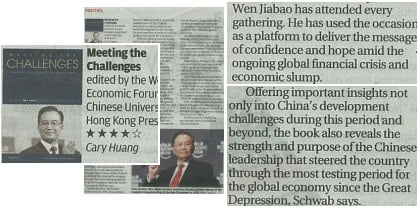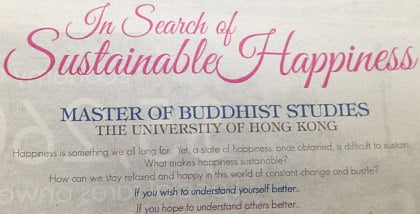A demonstration yesterday against creeping self-censorship in Hong Kong gets international coverage. The target of the protest is not an easily identifiable government propaganda department, but editors’ or writers’ insidious tweaking of copy at the behest of media owners eager to shoe-shine Beijing. An example in the Wall Street Journal link is a journalist being pressured to stress the supposed economic damage that will result from the Occupy Central pro-democracy civil disobedience movement.
A variant of the phenomenon amusingly also presented itself yesterday in the South China Morning Post’s book reviews. Reviewer Cary Huang gave 4 stars out of 5  to a collection of former Premier Wen Jiabao’s speeches over the years at the World Economic Forum at Davos, published by Chinese University of HK. If the review is online, it’s buried deep in the website (the SCMP is the only paper in the world with no arts section). The point is that the review is ludicrously fawning, given that most compilations of public speeches rank alongside astrology and self-help in terms of literary respectability, and most readers would rather get stuck into Working Class Cats.
to a collection of former Premier Wen Jiabao’s speeches over the years at the World Economic Forum at Davos, published by Chinese University of HK. If the review is online, it’s buried deep in the website (the SCMP is the only paper in the world with no arts section). The point is that the review is ludicrously fawning, given that most compilations of public speeches rank alongside astrology and self-help in terms of literary respectability, and most readers would rather get stuck into Working Class Cats.
Among others at the press-freedom gathering was a group of independent commentators, including former establishment figures who bravely attempt to occupy an elusive middle/neutral ground between openly pro-democrat and slavishly pro-Beijing. The rally also prompted a thinly attended counter-demonstration by the sinister-sounding Council on Media Conduct Supervision – a group of mouth-frothing ‘patriots’ who probably worry even the United Front puppet masters in Beijing’s Liaison Office. You have to give them credit for thinking out of the box: creating and publicizing a movement that supports, even maybe demands, self-censorship takes a bit of imagination.
Which brings us to the subject of marketing. We are told that Mainlanders are following the rest of the world and starting to see through the designer-label luxury-tat scam perpetrated by conglomerate-owned pseudo-brands like Louis Vuitton, Hermes, etc. Wouldn’t we love to believe it? In the event that these tacky mega-brands go the way of the dinosaur, some very odd fashion/design concepts are evolving in low-rent malls away from Central, ready to take their place in the retail ecology.
For example, there’s something called either Chelosophy or BSX, seen on a ‘coming soon’ ad pasted over a unit under renovation. They are ‘looking at the bottom part of town’ and ‘talk to many beggars’, while their noses ‘inhale attentively the misery’. I think they’ll be selling clothes, as is the outlet opposite, called Fingercroxx. Can’t wait to see these freaks wipe the floor with Gucci. Next door, there’s a store selling face towels ‘with further options’ – sadly unspecified.
We began with Chinese University plumbing the depths of marketing by publishing their SCMP-endorsed boot-licking collection of Wen Jaibao’s scintillating speeches at the Davos bore-fest. We also have Hong Kong U joining them, advertising (in the Standard) a Master’s degree in Buddhist Studies as if it were some sort of feminine hygiene product. I mean… that pink typeface. In fact, it’s not advertising the degree – a course, no doubt, of rigorously objective inquiry into an Asian philosophy-cum-belief system – but the eternal and heavenly rewards and ‘Sustainable Happiness’ allegedly enjoyed by devout followers of the faith. Can’t wait to see their ad for the Master’s in chemistry.
We end on a happy note: crummy – or at least slightly clunky – marketing for a product that actually turns out to be pretty good.  After walking past Mr Bing a thousand times, I go in and try. I guess, it’s too late to ditch the irritating cartoon ‘red chef’ logo, but they could amend the motto about crepes, which is a nasty over-blown French pancake. This is based on Beijing jianbing: fast-food fit for human consumption, and yummy. Plus you get to see this performance, which is worth HK$25 alone.
After walking past Mr Bing a thousand times, I go in and try. I guess, it’s too late to ditch the irritating cartoon ‘red chef’ logo, but they could amend the motto about crepes, which is a nasty over-blown French pancake. This is based on Beijing jianbing: fast-food fit for human consumption, and yummy. Plus you get to see this performance, which is worth HK$25 alone.



Why don’t the Council on Media Behaviour Control censor themselves while jumping off a cliff?
Mr. Bing, surely it has no relationship to ‘bing bing’, a colloquialism for faeces by any chance? As to HKU, it was the Buddha who said that ‘want is the root of unhappiness’. If you stop ‘wanting’ you become happier. Presumably, HKU isn’t charging anything or ‘wants nothing’ for its master of BS? On another note, I chortled to see the allegation of ‘racism’ used as a weapon against ‘nuisance’ aimed at tourists from the mainland. Even the news reporter blushed in embarassment.
Cary Huang’s open solicitation letter for a job at the China Daily can be enjoyed online:
http://www.scmp.com/lifestyle/books/article/1432580/book-review-meeting-challenges-speeches-wen-jiabao-world-economic
If you can make a law that makes a Han Chinese insulting another Han Chinese racism, then the same law can be used to stop all expressions of opinion. Yet, that’s exactly what Ronnie TONG was argueung for on R3 this morning.
Racism is wrong and insulting someone personally is wrong, but there’s the situation. Mainland Chinese are included in the non-discrimination law meant to stop hiring preference based on appearance or sexuality and other similar situations. Now, extend that to simply saying anything considered discriminatory being included in this law and you have a situation where hurling an insult, as crass as it may be, becomes a hate crime and you can be arrested on trumped up charges. Welcome to Asia’s World City.
This has been paranoid hyperbole, but you get it.
The Tourism Board says 54 million tourists visited Hong Kong last year, with over 75 percent of them coming from the mainland.
The Board said tourism had become a very important pillar of the economy and it would invest more resources to attract visitors.
But a number of lawmakers at a Legislative Council panel on economic development questioned such a move, saying some Hong Kong people were beginning to oppose the huge influx of mainland tourists.
The Labour Party’s Fernando Cheung said the government must review its tourism policy as soon as possible because people’s lives are being increasingly affected.
The Commissioner for Tourism, Philip Yung, remained adamant. He said tourism is bringing in a lot of profits, and said the city should increase its capacity and develop new attractions.
Every time someone ( usually from the Mainland) tells me they want to buy some famous brand products in HK ( LV, Guggi, Coach … Rolex ! etc) I tell them that they are are all made in China and exported to Italy, or wherever where the label is stitched on , then re-exported back to HK
Well, OK, Rolexes are at least assembled in Switzerland, but all the gear wheels are made in China – after all a gear wheel is a gear wheel !
I tell them to calculate the enormous cost of advertising in HK’s glossy magazines : it costs HK$500 just for a tiny one inch square box in the SCMP classified to sell your second hand car !
But they still don’t listen
I tell them I once knew the owner of a boutique perfume company in France who told me that 90% of ‘production’ cost price price of the perfume was advertising, 8% was the fancy box and bottle and only 2% was the actual liquid , but they still don’t listen.
So I give up.
And happily wear my Swatch . At least that’s good value for money !
@Gumshoe – I suspect the government has already banned discrimination on the basis of ability in hiring people for top government jobs.
Can anyone explain why a T-shirt that probably costs $10 to make and sells for $20 suddenly becomes worth $200 if a famous designer’s name is on it? Some designer clothes may actually feature unusual or artistic designs which justify a higher price, but how much “design” can you add to a T-shirt?